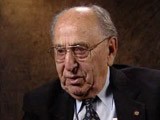You searched for: ������������������������������������������������aptao168���grew
<< Previous | Displaying results 111-120 of 171 for "������������������������������������������������aptao168���grew" | Next >>
-
Edit Gruenberger
ID CardEdit was the second of three children born to Hungarian-speaking Jewish parents in the city of Kosice in the southeastern part of Czechoslovakia known as Slovakia. She grew up a Czechoslovak citizen. As a young girl, she attended a Jewish elementary school. Her father was a tailor whose workshop was in the Gruenbergers' apartment. 1933-39: After Edit finished elementary school, she entered secondary school. The language of instruction was Slovak and Jews faced no discrimination until November 1938 when…
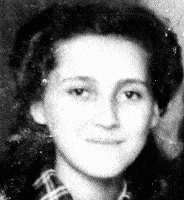
-
Léon Degrelle
ArticleLéon Degrelle was an extreme right-wing Belgian politician and Nazi collaborator. After the war, he continued to spread pro-Nazi propaganda for decades. Learn more.
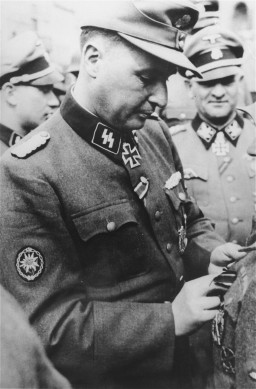
-
Leah Hammerstein Silverstein describes the Tarnow ghetto after a roundup
Oral HistoryLeah grew up in Praga, a suburb of Warsaw, Poland. She was active in the Ha-Shomer ha-Tsa'ir Zionist youth movement. Germany invaded Poland in September 1939. Jews were forced to live in the Warsaw ghetto, which the Germans sealed off in November 1940. In the ghetto, Leah lived with a group of Ha-Shomer ha-Tsa'ir members. In September 1941, she and other members of the youth group escaped from the ghetto to a Ha-Shomer ha-Tsa'ir farm in Zarki, near Czestochowa, Poland. In May 1942, Leah became a courier…
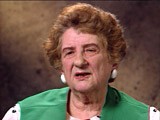
-
Nesse Galperin Godin describes her appearance at the time she was liberated
Oral HistoryNesse's family had a dairy business. The Germans occupied Lithuania in 1941 and established a ghetto in Siauliai. Nesse lived in the ghetto until 1943 when she was old enough to work. In 1944 Nesse, her mother, and a brother were deported to the Stutthof camp near Danzig. Nesse worked in several Stutthof subcamps until January 1945, when the inmates were put on a death march. She was liberated by the Soviets in March. Nesse, her mother, and two brothers survived, and she arrived in the United States in…
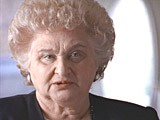
-
Mayer Adler describes surviving as a child in Auschwitz
Oral HistoryMayer grew up in a rural town that was occupied by Hungary in 1940. After Germany occupied Hungary in March 1944, Mayer and his family were forced into a ghetto. They were then deported to the Auschwitz camp in Poland, where Mayer's parents and brothers perished. Mayer was selected for forced labor, and was later transferred to a satellite camp of Dachau, in Germany. He was liberated from Dachau in 1945. Sponsored by a children's committee, he immigrated to the United States.
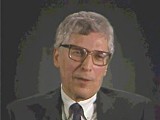
-
Mayer Adler describes his family's preparations for deportation
Oral HistoryMayer grew up in a rural town that was occupied by Hungary in 1940. After Germany occupied Hungary in March 1944, Mayer and his family were forced into a ghetto. They were then deported to the Auschwitz camp in Poland, where Mayer's parents and brothers perished. Mayer was selected for forced labor, and was later transferred to a satellite camp of Dachau, in Germany. He was liberated from Dachau in 1945. Sponsored by a children's committee, he immigrated to the United States.
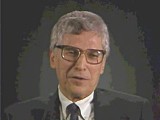
-
Leo Melamed describes speaking several languages as a child in prewar Bialystok
Oral HistoryLeo was seven years old when Germany invaded Poland in September 1939. Before the war, Leo's father was a mathematics teacher and member of the Bialystok City Council. Fearing arrest, Leo's father fled Bialystok for Vilna just before the German occupation. Leo and his mother eventually joined his father in Vilna. After the Soviets occupied Vilna, Leo's father obtained transit visas to Japan. The family left Vilna in December 1940, traveled across the Soviet Union on the Trans-Siberian Express, and arrived…
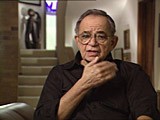
-
Morris Kornberg describes forced labor beginning after the German invasion of Poland
Oral HistoryMorris grew up in a very religious Jewish household and was active in a Zionist sports league. When the Germans invaded Poland in September 1939, Morris's town was severely damaged. Morris's family was forced to live in a ghetto, and Morris was assigned to forced labor. After a period of imprisonment in Konskie, a town about 30 miles from Przedborz, Morris was deported to the Auschwitz camp. He was assigned to the Jawischowitz subcamp of Auschwitz. In January 1945, Morris was forced on a death march and…
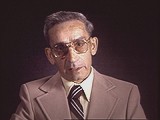
-
Morris Kornberg describes arrival at Auschwitz
Oral HistoryMorris grew up in a very religious Jewish household and was active in a Zionist sports league. When the Germans invaded Poland in September 1939, Morris's town was severely damaged. Morris's family was forced to live in a ghetto, and Morris was assigned to forced labor. After a period of imprisonment in Konskie, a town about 30 miles from Przedborz, Morris was deported to the Auschwitz camp. He was assigned to the Jawischowitz subcamp of Auschwitz. In January 1945, Morris was forced on a death march and…
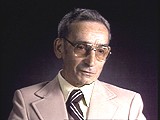
-
Miles Lerman describes the impact of his wartime experiences
Oral HistoryMiles Lerman was a Holocaust survivor, partisan fighter in the forests of Poland, international leader in the cause of Holocaust remembrance, and a "founding father" of the United States Holocaust Memorial Museum.
